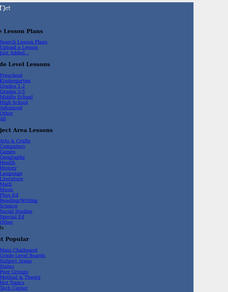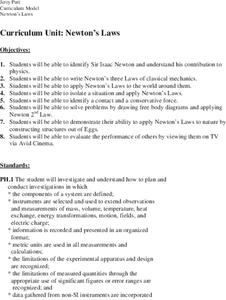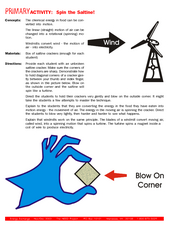Curated OER
Weather
Students participate in a variety of mini-lessons including experiments, literature readings, physical education components, music, data gathering and recording and more to expose them to several themes of weather; i.e. water cycle,...
Curated OER
Forces and Movement
Pupils examine types of forces and movements. They identify different causes that can affect movement and speed. They create their own predictions about they believe to be the outcome of an experiment.
Curated OER
Teaching Avogadro's Number
Students design an experiment to determine Avogadro's number. Students utilize an ammeter, an electrolytic cell and internet research.
Curated OER
TE Activity: Pitch and Frequency
Students experiment with a vibrating ruler and a kazoo to study the different pitches and frequencies they produce. They create both high and low pitch sound waves. They examine how engineers use sound energy when designing electronic...
Curated OER
Newton's Laws
Students examine and discuss Newton's Laws and discover his contribution to physics. In groups, they participate in an experiment in which they much apply the Laws to the world around them. They describe contact and conservative forces...
Curated OER
5E Magnets
Fourth graders, when working with magnets, make a prediction about what will happen if you put two ring magnets on an upright pencil, with 100% accuracy. They also experiment with magnets on poles to see which one pushes the other one away.
Curated OER
Earth, Sun and Moon
Students investigate that the sun is at the center of the solar system through role play. One student is the sun and one student is the Earth. The students then show how the Earth orbits around the sun. Students view a flashlight and...
Curated OER
Energy from the Sun
In this energy worksheet, students conduct an experiment and observe the various ways in which heat energy can be transferred. They explain what happened to the wooden block when it was placed in direct sunlight. Students also explain...
Curated OER
Isotopes; Molecular Notation; Electron Orbits
In this isotopes, molecular notation, and electron orbits learning exercise, students read selections pertaining to isotopes, mass number, molecular notation, electric attraction, and electron orbits. In addition, students complete 11...
Curated OER
Solids and Liquids
Students investigate what happens to solids and liquids when they change from one form to another. In this states of matter lesson, students work in groups on a virtual experiment that requires them to collect data regarding the melting...
Curated OER
How We See Things
Young scholars explain that when a beam of light is reflected from its surface, it changes direction. In this virtual science experiment lesson plan, students complete an activity that requires them to investigate how flat mirrors...
Curated OER
Spin the Saltine!
Students investigate chemical energy. In this physical science lesson, students blow on saltine crackers to demonstrate how chemical energy in food can be converted to motion. Students compare the saltine cracker experiment to how...
Curated OER
Energy in Today's Global Society
Students explain how heat is used to generate and produce electricity. In this energy lesson students complete several activities that show them about the different fuels used for heating.
Curated OER
Skin: Skin Prints
Students explore human anatomy by participating in a print experiment. In this human skin lesson, students define the term "epidermis" and utilize computer paper, pencils, tape and baby wipes to create a print of their own skin. Students...
Curated OER
Engineers for a Sustainable World
Students experiment with making a water filtration system. In this engineering lesson, students get into groups and are challenged to use only eight items to create a water filter. When finished, students compare and contrast their results.
Curated OER
Introduction to Friction
Students study the properties of the frictional force between two surfaces in contact. They inspect various phenomena in nature where friction plays an important role and demonstrate
Curated OER
TE Lesson: Factors Affecting Friction
Students investigate the effect of weight on normal friction or the friction due to surface roughness. They tell about the effects of contact area that occurs as a result of molecular attraction by looking at data on line graphs.
Curated OER
Will There be Enough Water?
Students investigate water usage, water available, and water demand historically in the local area. They use projections of water usage, availability and demand up to the year 2050. Students use graphs to relate as well as compare and...
Curated OER
Celebrating Benjamin Franklin
Young scholars explore various websites featuring the life and achievements of Benjamin Franklin. They investigate Franklin's roles in colonial society as well as pictures of his various inventions. They view excerpts of historical...
Curated OER
Rockets
Students work together in groups of 5 to build a model rocket from a rocket kit. For this rocket lesson, students launch the rocket when it is constructed. The students will use simple materials to build and launch their own model rocket.
Curated OER
Frankenstein (Teacher Zone)
Students are introduced to the life and art of Mary Shelley and consider the still-relevant themes of the Frankenstein myth. Also, students become acquainted with the nineteenth century fascination with electricity by reviewing...
Curated OER
E3 Ret Lesson Plan
Students explore friction. In this physics lesson plan, students will cover metal blocks with film to determine the changes caused by static and kinetic friction.
Curated OER
Turn On A Light And Do Your Own Revegetation
Pupils use electricity and plant a seed to observe the process when coal is the major fuel source to produce electricity. They use the packet of native seeds to experiment with revegetation.
Curated OER
Static Cling
Fifth graders examine the principles of static electricity and positive and negative charges. They observe and then perform experiments with static electricity. They record examples in their journals.

























